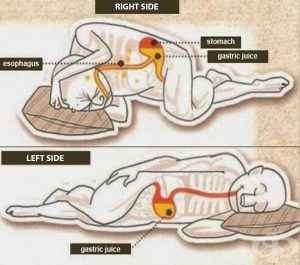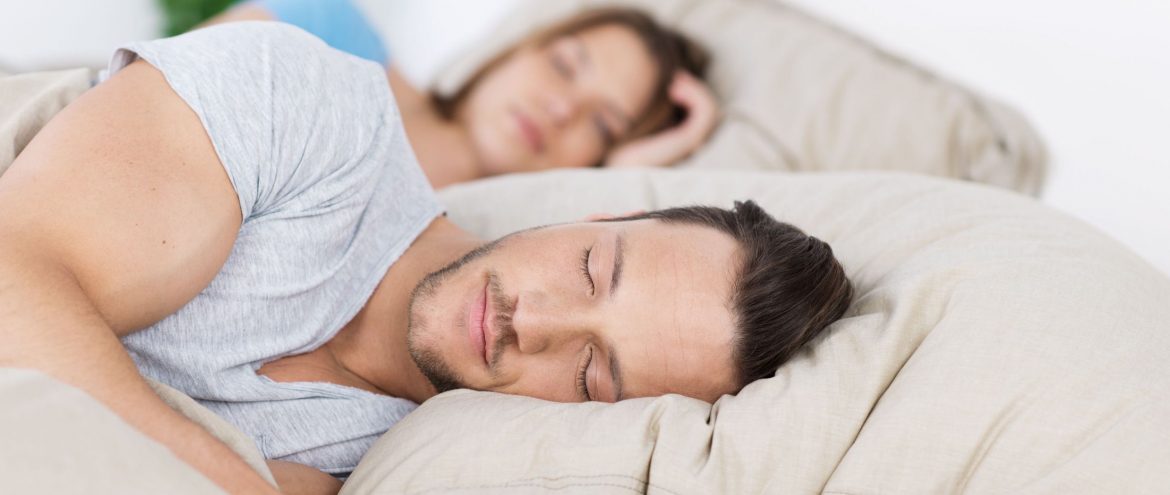We all know that good sleep is critical to maintain a healthy life and, especially, to keep your body and mind going all day. Multiple studies have shown that sleeping at least 8 hours per night boosts your immune system, improves cognitive functions and brings a variety of health benefits.
On the other hand, sleep disruptions can lead us to feeling tired during the day and not being able to focus.
Below, are 4 tips to improve your sleep.
1) Sleep on your left side
 We know it can be tough to fall asleep in a position different from your usual one, but this could really help you improving your sleep. When you lie on your right side, the Esophagus (the tube through which food passes when you swallow it) ends up below the Stomach (the place where food gets broken apart from digestive enzymes and hydrochloric acid). In this position, the acid from the stomach (gastric juice) can leak into your esophagus. This can give you that terrible acid reflux or heartburn, which might keep you up at night. If heartburn is keeping up you… try sleeping on your left.
We know it can be tough to fall asleep in a position different from your usual one, but this could really help you improving your sleep. When you lie on your right side, the Esophagus (the tube through which food passes when you swallow it) ends up below the Stomach (the place where food gets broken apart from digestive enzymes and hydrochloric acid). In this position, the acid from the stomach (gastric juice) can leak into your esophagus. This can give you that terrible acid reflux or heartburn, which might keep you up at night. If heartburn is keeping up you… try sleeping on your left.
2) Keep it Cool.
 One of the strategies for creating ideal sleeping conditions is to keep your room cold-ish at night. The typical recommendation is to keep the room between 65 and 72 degrees Fahrenheit (or 18 and 22 degrees Celsius). H. Craig Heller, PhD, professor of biology at Stanford University, explained that a cooler room can help inducing sleep, encouraging our physiological mild drop in body temperature.
One of the strategies for creating ideal sleeping conditions is to keep your room cold-ish at night. The typical recommendation is to keep the room between 65 and 72 degrees Fahrenheit (or 18 and 22 degrees Celsius). H. Craig Heller, PhD, professor of biology at Stanford University, explained that a cooler room can help inducing sleep, encouraging our physiological mild drop in body temperature.
3) Kill the lights.
 Before electricity, dark usually meant “bed time,” and that’s for a very good reason. Artificial light has shown to reduce the production of Melatonin (the sleep hormone).
Before electricity, dark usually meant “bed time,” and that’s for a very good reason. Artificial light has shown to reduce the production of Melatonin (the sleep hormone).
Therefore, keeping the lights down before bed, avoiding staring at bright displays (which have high concentration of blue light) and keeping your room dark during your sleep, may help you improving your sleep.
4) Work out.
 Last, but no least. Increasingly, scientific evidence is showing that regular physical activity may serve as a non-pharmaceutical alternative to improve sleep. Furthermore, recent studies demonstrate a link between regular physical activity and perceptions of sleepiness during the day, which suggests that participation in physical activity on a regular basis may positively influence an individual’s productivity at work, or in the case of a student, influence their ability to pay attention in class.
Last, but no least. Increasingly, scientific evidence is showing that regular physical activity may serve as a non-pharmaceutical alternative to improve sleep. Furthermore, recent studies demonstrate a link between regular physical activity and perceptions of sleepiness during the day, which suggests that participation in physical activity on a regular basis may positively influence an individual’s productivity at work, or in the case of a student, influence their ability to pay attention in class.
Check back every week for more educational facts and tips for a healthy lifestyle!
